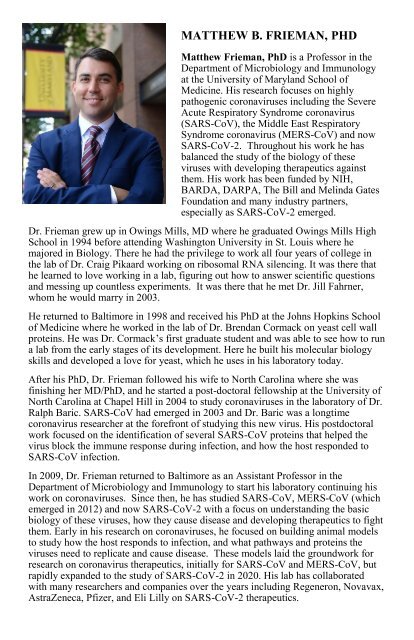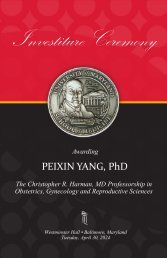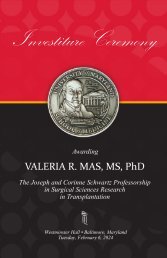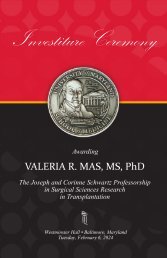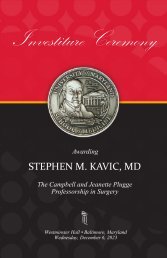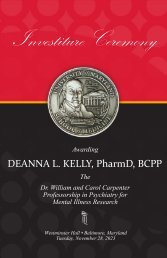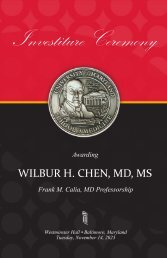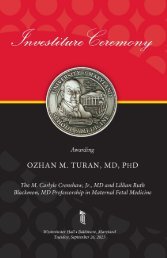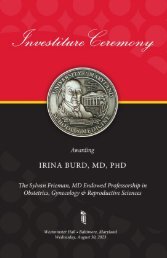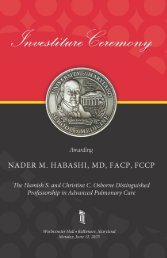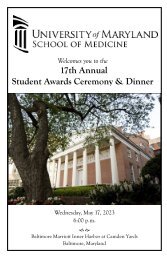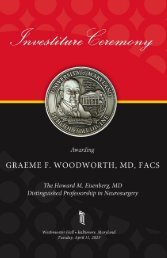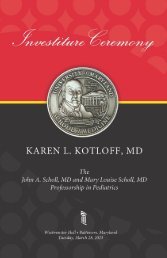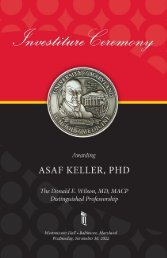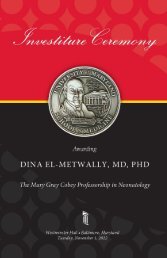Investiture Program for Matthew B. Frieman, PhD
Create successful ePaper yourself
Turn your PDF publications into a flip-book with our unique Google optimized e-Paper software.
MATTHEW B. FRIEMAN, PHD<br />
<strong>Matthew</strong> <strong>Frieman</strong>, <strong>PhD</strong> is a Professor in the<br />
Department of Microbiology and Immunology<br />
at the University of Maryland School of<br />
Medicine. His research focuses on highly<br />
pathogenic coronaviruses including the Severe<br />
Acute Respiratory Syndrome coronavirus<br />
(SARS-CoV), the Middle East Respiratory<br />
Syndrome coronavirus (MERS-CoV) and now<br />
SARS-CoV-2. Throughout his work he has<br />
balanced the study of the biology of these<br />
viruses with developing therapeutics against<br />
them. His work has been funded by NIH,<br />
BARDA, DARPA, The Bill and Melinda Gates<br />
Foundation and many industry partners,<br />
especially as SARS-CoV-2 emerged.<br />
Dr. <strong>Frieman</strong> grew up in Owings Mills, MD where he graduated Owings Mills High<br />
School in 1994 be<strong>for</strong>e attending Washington University in St. Louis where he<br />
majored in Biology. There he had the privilege to work all four years of college in<br />
the lab of Dr. Craig Pikaard working on ribosomal RNA silencing. It was there that<br />
he learned to love working in a lab, figuring out how to answer scientific questions<br />
and messing up countless experiments. It was there that he met Dr. Jill Fahrner,<br />
whom he would marry in 2003.<br />
He returned to Baltimore in 1998 and received his <strong>PhD</strong> at the Johns Hopkins School<br />
of Medicine where he worked in the lab of Dr. Brendan Cormack on yeast cell wall<br />
proteins. He was Dr. Cormack’s first graduate student and was able to see how to run<br />
a lab from the early stages of its development. Here he built his molecular biology<br />
skills and developed a love <strong>for</strong> yeast, which he uses in his laboratory today.<br />
After his <strong>PhD</strong>, Dr. <strong>Frieman</strong> followed his wife to North Carolina where she was<br />
finishing her MD/<strong>PhD</strong>, and he started a post-doctoral fellowship at the University of<br />
North Carolina at Chapel Hill in 2004 to study coronaviruses in the laboratory of Dr.<br />
Ralph Baric. SARS-CoV had emerged in 2003 and Dr. Baric was a longtime<br />
coronavirus researcher at the <strong>for</strong>efront of studying this new virus. His postdoctoral<br />
work focused on the identification of several SARS-CoV proteins that helped the<br />
virus block the immune response during infection, and how the host responded to<br />
SARS-CoV infection.<br />
In 2009, Dr. <strong>Frieman</strong> returned to Baltimore as an Assistant Professor in the<br />
Department of Microbiology and Immunology to start his laboratory continuing his<br />
work on coronaviruses. Since then, he has studied SARS-CoV, MERS-CoV (which<br />
emerged in 2012) and now SARS-CoV-2 with a focus on understanding the basic<br />
biology of these viruses, how they cause disease and developing therapeutics to fight<br />
them. Early in his research on coronaviruses, he focused on building animal models<br />
to study how the host responds to infection, and what pathways and proteins the<br />
viruses need to replicate and cause disease. These models laid the groundwork <strong>for</strong><br />
research on coronavirus therapeutics, initially <strong>for</strong> SARS-CoV and MERS-CoV, but<br />
rapidly expanded to the study of SARS-CoV-2 in 2020. His lab has collaborated<br />
with many researchers and companies over the years including Regeneron, Novavax,<br />
AstraZeneca, Pfizer, and Eli Lilly on SARS-CoV-2 therapeutics.


